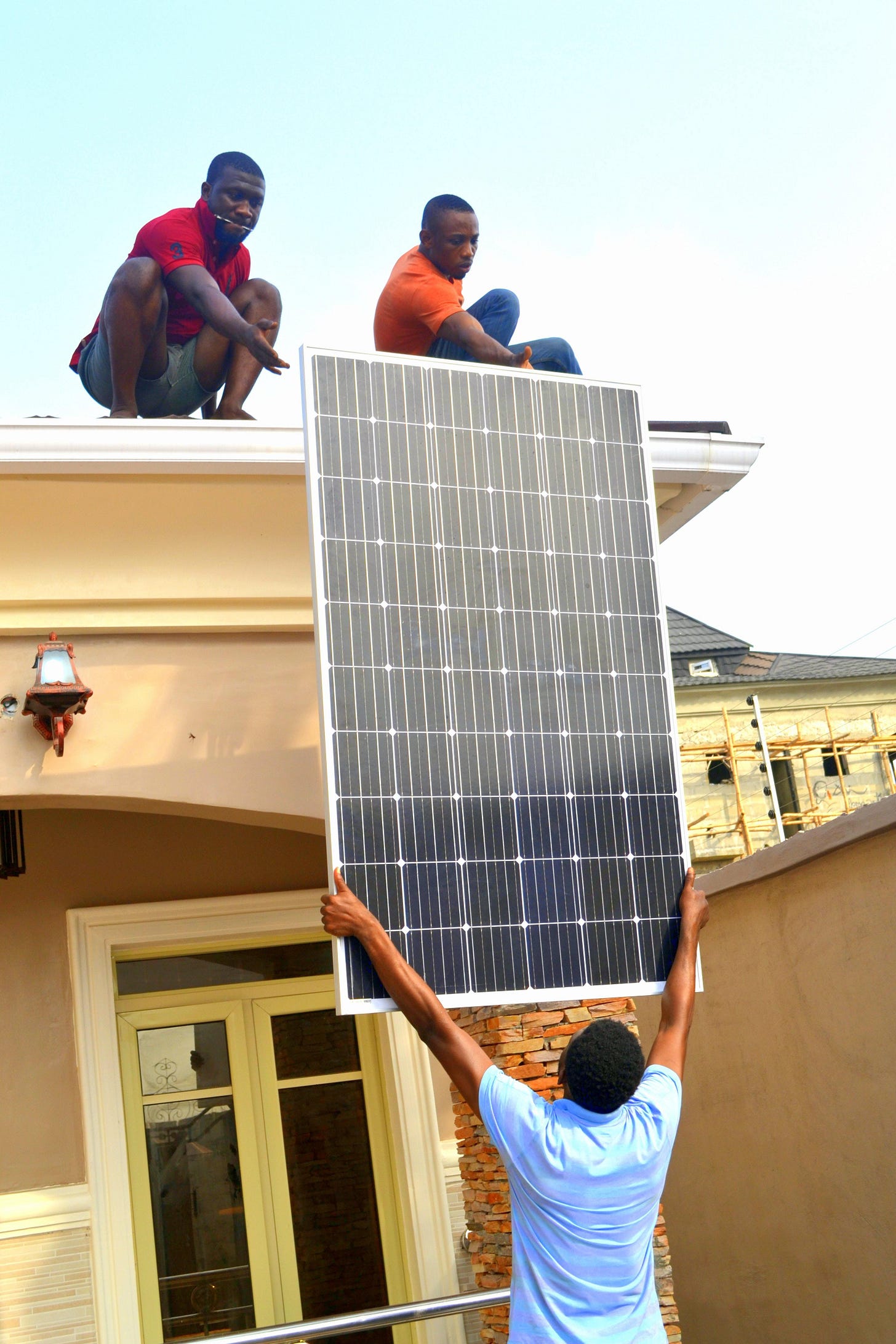#24 - How lockdown in Nigeria relies on fossil fuel generators
By Justice Nwafor in Ibadan, Nigeria
Hello, and welcome to this latest edition of From a Climate Correspondent, a newsletter exploring the climate crisis around the globe.
Each week we share insights from a different country on the fight against climate change. This week's guest post comes from journalist Justice Nwafor in Nigeria, who writes about how an often unstable supply of electricity from the grid is leading to added difficulties in lockdown.
If you'd like to support us, you can invite us for a coffee over at our Patreon page. We're grateful for any contributions!
Thanks for reading and stay safe,
From a Climate Correspondent team - India, Jocelyn, Lou and Mat
How lockdown in Nigeria relies on fossil fuel generators
No. 24 by Justice Nwafor

A man and a young boy work on a "Better pass My Neighbour" power generator set late in the night in Lagos, Nigeria. Image credit: Ajibola Fasola/Wikimedia Commons
My hands clasped to a silver steel rail and my face smacked with tiredness, I stand on the balcony of my apartment and agonise in silence. It’s 2pm and there is no end in sight to the loud noise from electricity generating sets at adjoining apartments.
The power cut from the national grid has now lasted about twelve hours and no one knows when it will be restored. So I can’t blame my neighbours for the noise. But I just wished the exhausting noise would stop.
In fact, I am just as guilty: I had just submitted a report and my own generator had buzzed from 8am to 1pm. My neighbour is yet to finish his job for the day and his kids wouldn’t love to miss their favourite television show, coming up in three hours.
So the diesel and petrol-powered generators must buzz on - and the noise and emission of carbon monoxide, carbon dioxide, nitrogen oxide and other pollutants has to continue.
This neighbourhood in Ibadan - Nigeria’s third most populous city - is not the only one that has seen a spike in generator usage of late. The lockdown imposed by the government to curtail the spread of coronavirus in the country has restricted interstate movement, shut-down schools and forced many workers and businesses to operate from home.
This means more people are at home more of the time - and thus using more household electricity there than previously. The problem is that the national grid lacks the capacity to meet this need.
Chronic problem
Nigeria’s electricity challenges are well known. Only 57% of the country’s 200 million people have access to electricity. South Africa - with about a third of Nigeria’s population - provides electricity to 91% of its population.

Source: IEA. Chart made using Datawrapper
Even for homes which are powered by the national grid, millions regularly experience persistent cuts usually lasting hours and in some cases days or weeks. An average home in Nigeria gets national grid power for about nine hours daily, according to a 2019 Bloomberg report. But in some homes it can be much worse.
While Nigeria’s overall capacity is low, its failure to maximise its installed generation capacity is also a big challenge. It typically generates less than a third of its capacity. An IMF report last year found the power crisis costs Nigeria - Africa’s largest economy - a whooping $29bn annually, an amount higher than its annual infrastructure budget.
Nigerians are now spending $14bn a year to buy and power the generators, Ebrima Faal, the director in charge of African Development Bank (AfDB) in Nigeria, recently said.
Working in lockdown
Shola Balogun, an employee of Nigeria’s Sterling Bank in Lagos, is also working from home due to the lockdown. She tells me she gets less than three hours of national grid power daily and now relies on generators to work, even though the noise makes her uncomfortable. “I’m aware of the health hazards and what the emissions do but we are constrained.”
Peter Offor works as a call centre agent for iSON Xperience which manages the call centres of MTN and Airtel - two of Nigeria’s largest telcos. A few weeks into the coronavirus outbreak in the country, the firm asked Peter and about one hundred and fifty other employees to work from home.
“I was not prepared but I had to dip into my savings to buy a generator”, he tells me. “The good thing is, we are given 1500 Naira (about $4) daily to buy fuel”.
Other firms like movie streaming platform iROKOtv, fintech startup Paystack and Jumia - Africa’s largest e-commerce hub with over a thousand employees in Nigeria - have asked their employees to work from home.
These employees have now moved from workplaces where just a few generators power many gadgets to homes where each person has to provide their electricity. Needless to say this crisis comes with a huge price. Beyond the environmental hazards which are well known, the country is paying dearly.
Banning imports
Across middle-income Nigerian homes, the most common generator is the low-cost mini type with tank capacity of about four litres. In Nigerian Pidgin English, this generator is referred to as ‘I better pass my neighbour’, dloosely translated as “I am better than my neighbour”.
This type and other small petrol generators are installed in 11 million homes across the country, with a collective capacity eight times higher than that of the national grid, according to a report by Dalberg, a global strategy and policy advisory firm.
The government thinks the best way to solve the power puzzle is to ban mass importation of the low-cost generator, but many parliamentarians disagree.
In March this year, a bill to criminalise importation and sale of generators was introduced, but received heavy criticisms. The parliament was reminded that even the country’s presidential palace sometimes runs on generators, costing the country 664.2 million Naira (about $1.7m) between 2010 and 2019.
The way forward
Many recommendations have been made. Experts have advised that embracing clean energy is the way out of this puzzle. The country is endowed with great potential in solar energy.
Although some start-ups are beginning to mine this gap, the initial one-off cost of solar panels is an impediment.

Kalorfulspace Monz Solar Panel. Image credit: Paul Bonafide Eferiano
Some firms like Lumos Nigeria have adopted a price model that allows homes to subscribe per day, week or month, but they face the challenge of awareness.
However, there are hopes that with new investments, Lumos and other clean energy firms might just be able to power millions of homes and reduce dependence on the national grid, fossil-powered generators, and make the air in Nigerian homes a lot more safe.
For now, while the coronavirus-imposed restrictions last, I hope the national grid serves Nigerians the best it can, for the sake of our health, our environment and our sanity.
Note: A previous version of this article incorrectly said the bill to criminalise importation of generators was introduced in 2015. It was in fact introduced in March this year, this has been updated.
Must reads from the region
Oil Is Crashing Again. It Could Take Whole Governments Down With It. Eric Levitz, New York Magazine
For the citizens of many oil-producing states, these “near-term demand losses” for oil mean cuts in social services and public employment in the midst of a pandemic-induced depression, writes Levitz.
Coronavirus Risks Worsening a Food Crisis in the Sahel and West Africa, Leena Koni Hoffmann and Paul Melly, Chatham House
The COVID-19 pandemic has hit Sahel and West Africa when the region is already under severe pressure from the effects of climate change and violent insecurity. This Chatham House blog outlines what can be done.
‘Biodiversity protection key to post-COVID-19 recovery’, Victor Gbonegun, The Guardian Nigeria
Nigeria's environment minister Sharon Ikeazor recently stressed the need for Nigerians to stay on track with climate targets to recover a greener and better planet for the people, reports local newspaper The Guardian Nigeria.
After Covid-19, Africa can build back better, Amina J Mohammed, City Press
Africa can build back better despite the devastating effects of the pandemic, including by accelerating a transition to low carbon, climate-resilient growth, writes Amina J Mohammed, the Nigerian-British politician who is now deputy secretary-general of the UN.
What else I’ve been listening to
Fresh Air For All: A Remedy Within Reach, Joshua Goldstein and Heather Tallis, The Nature Conservancy
How conservation can help us find a lasting solution to air pollution in our cities. To catch up you can read the first and second in the series. I’m sure you’d love it.
Justice Nwafor is a journalist covering politics, environment and global health in Nigeria and west Africa. He tweets @realJust_ice.
Been forwarded this email?
Did someone send this on to you? Why not sign up yourself!
Who we are
Lou Del Bello is an energy and climate journalist based in Delhi, India.
Jocelyn Timperley is a freelance climate & science journalist based in San José, Costa Rica.
India Bourke is an environment journalist based in Hong Kong.
Mat Hope is investigative journalist based in Nairobi, Kenya.


